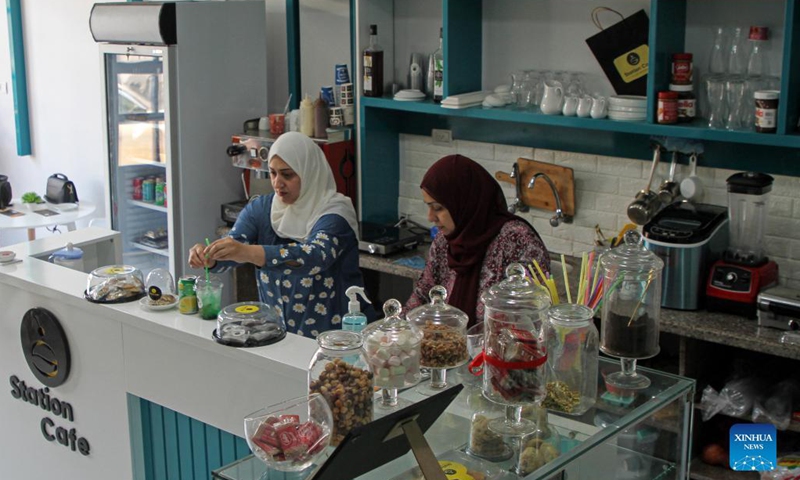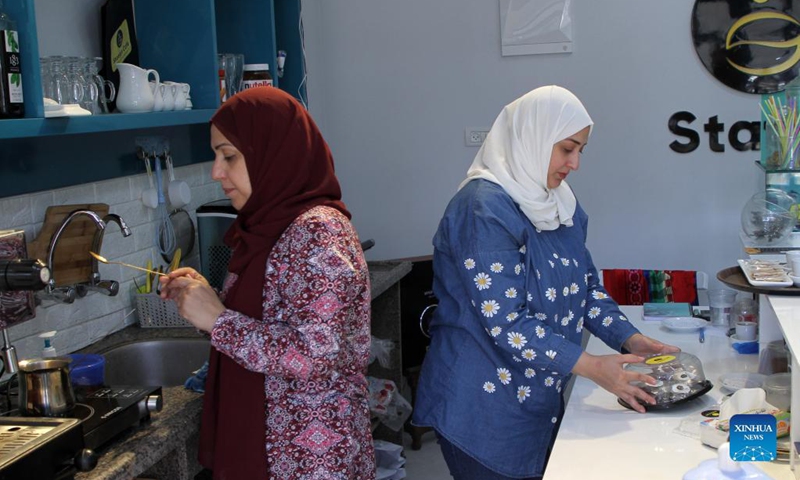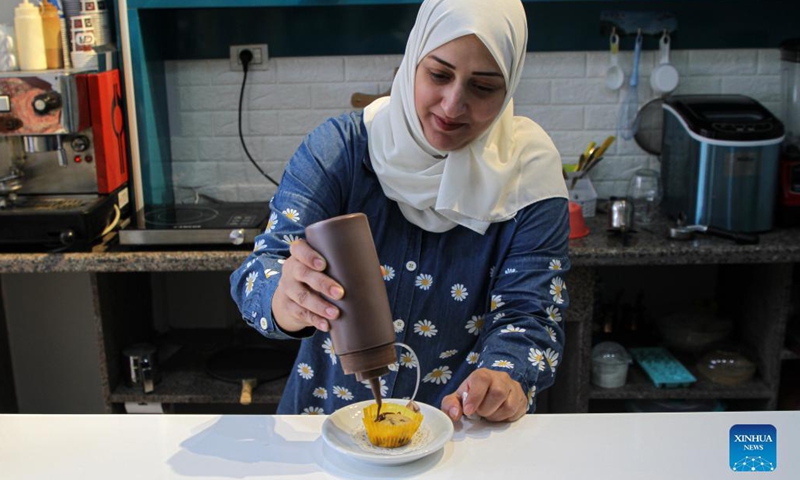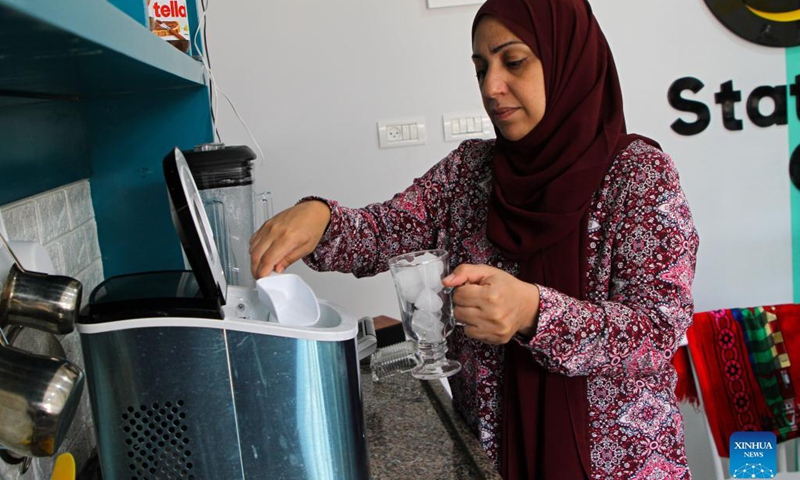
Palestinian sisters Ahlam (R) and Marwa Khadra work at their own cafe "Station Cafe" in Gaza City, on Sept. 27, 2021. As the Gaza Strip has long been under the threat of high unemployment rate, many Palestinian women there have to rely on their own wits to make a living.(Photo: Xinhua)

Palestinian sisters Ahlam (L) and Marwa Khadra work at their own cafe "Station Cafe" in Gaza City, on Sept. 27, 2021. As the Gaza Strip has long been under the threat of high unemployment rate, many Palestinian women there have to rely on their own wits to make a living.(Photo: Xinhua)

Palestinian woman Marwa Khadra works at her own cafe "Station Cafe" in Gaza City, on Sept. 27, 2021. As the Gaza Strip has long been under the threat of high unemployment rate, many Palestinian women there have to rely on their own wits to make a living.(Photo: Xinhua)

Palestinian woman Ahlam Khadra works at her own cafe "Station Cafe" in Gaza City, on Sept. 27, 2021. As the Gaza Strip has long been under the threat of high unemployment rate, many Palestinian women there have to rely on their own wits to make a living.(Photo: Xinhua)
As the Gaza Strip has long been under the threat of high unemployment rate, many Palestinian women there have to rely on their own wits to make a living.
Ahlam and Marwa Khadra are a pair of sisters from Gaza, and they established their own cafe, named the "Station Cafe," in the area they live so as to help their husbands raise the family.
"Finding a job in Gaza is difficult, especially for women who are committed to raising children and meeting their daily necessities. And this is what prompted us to think of opening our own business," Ahlam told Xinhua.
The 37-year-old mother of four said she worked for 15 years in project management and coordination, which helped her understand the overall situation in Gaza and what kinds of jobs would be successful.
"I found that food and beverage projects are among the successful ones. And this encouraged my sister and me to open a cafe," the woman explained.
However, they soon realized it was easier said than done, as both of them have been suffering from poverty. They did not have money to start their new project, but that did not stop them from trying their luck.
They participated in a competition organized by the Palestine Employment Fund and won a "zero loan," meaning the loan would not be repaid until revenues are generated from the project.
"During the activity, a series of management and marketing courses were given. As a result, we were granted the loan and started implementing our project," Marwa Khadra told Xinhua.
"The project was a dream, especially in light of the difficult conditions that the Gaza Strip is going through, and we started implementing the dream on the ground with the simplest capabilities," the 39-year-old mother of five said.
She added that she and her sister took many courses to develop their ability to prepare various types of coffee and Arabic and Western sweets, including cookies, mini cheese, Saudi coffee dates, brownies, hot chocolate, and ice mousse mocha mojito and lotus balls.
"We are so happy that we've finally found our way to earn money to keep our families afloat after many years of suffering from poverty," the sisters said as they flashed smiles, adding that they earn about 50 U.S. dollars a day.
Nisreen, Aya and Horeya al-Ghoul are also sisters from the al-Shatea refugee camp who established a home project to create their own job opportunities as they failed to find jobs related to their academic background.
Al-Ghoul sisters turned their home kitchen into a small factory to produce sweets and pastries.
Nisreen al-Ghoul, who holds a bachelor's degree in applied science and education technology, told Xinhua that they came up with the project after they passed employment tests, succeeded, conducted interviews, worked according to the temporary contract system and then found themselves sitting at home, and unemployed.
"I had the ambition to create my own profession that would reflect my personality and make me feel my presence. So I proposed the idea to my sister Aya, whose circumstances were similar to mine," the 33-year-old woman said.
The three sisters relied on social media to promote their products by posting photos and videos through the "Caramel Cake" page on Facebook and Instagram.
They aspire to develop their project, increase the workforce after improving their economic conditions, boost the demand for their products, and move from the stage of promoting their products on social media networks to the ground.
The Gaza Strip, home to more than 2 million people, has been put under a tight Israeli blockade since the Hamas takeover of the coastal enclave in 2007.
According to a report issued by the Palestinian Central Bureau of Statistics, unemployment rate in the Gaza Strip reached 52 percent in 2020. In addition, 83 percent of the population lives in poverty.
The average daily income per capita is 2 U.S. dollars, according to the Gaza-based Popular Committee against the Israeli siege.
As a result, a high percentage of Palestinian husbands cannot provide for the basic needs of their families, especially those who work on a monthly contract or day-to-day basis.
This is the reason that pushed women to take matters into their own hands.
Mustafa Ibrahim, a Gaza-based human rights activist, told Xinhua that many other women in Gaza are trying to establish their own small projects to help their husbands with their daily expenses.
Sometimes, he says, the women are lucky as they have enjoyed the support and care of civil and governmental institutions.
"Despite many funding programs aiming to support women financially, the participation rate of women in the labor market in the strip does not exceed 20 percent, which is one of the lowest rates in the world," Mazen al-Ejla, a Gaza-based economist, told Xinhua.
Al-Ejla said that the unemployment rate is higher among women by more than 15 percent compared to men.
